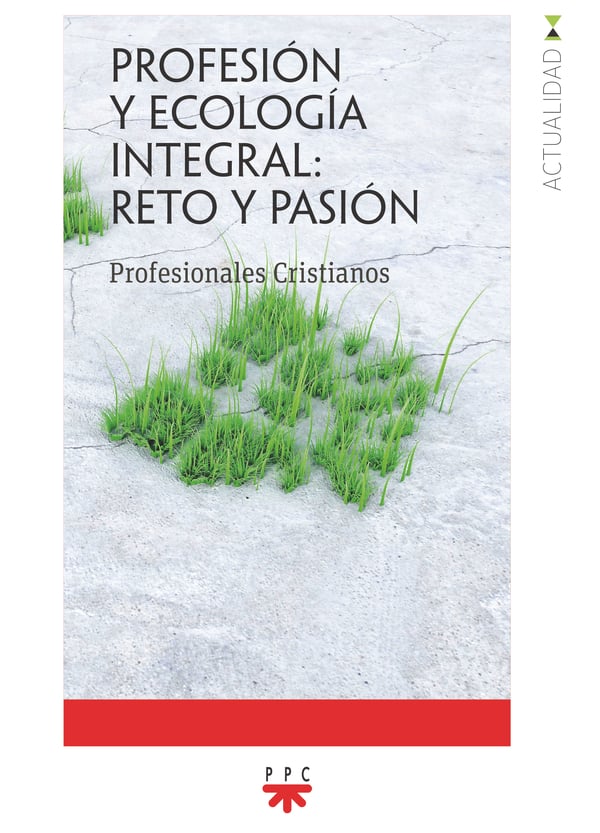Will we change with the pandemic or will we continue the same? This book gives an account of how the pandemic has served as a challenge for professionals who are questioning the experience of their faith in the midst of the world and their professions. Throughout this three-year period, his reflection and action on integral ecology have coincided since the experience of the pandemic. This is the result of this process, Leticia Panedas, the new head of the movement of Christian professionals, makes us the presentation of the book.
PROFESSION AND INTEGRAL ECOLOGY:
CHALLENGE AND PASSION
Movement of Christian Professionals
Plant a tree, have a child and write a book.
A noted poet pointed out that there are three things every person should do in their lifetime: plant a tree, have a child, and write a book. For our movement – Christian professionals – the publication of Profession and integral ecology: challenge and passion last October is all that at once. Its seven chapters broken down into its one hundred and fifty-three pages – all written by militants and friends of the movement – reveal a deep affection for the world of culture and the professional field. It is a work rooted in a deep spirituality, which does not intend anything other than to bear fruit and show those who look at it the sustenance that sustains it.
This tree-child-book is a trace of what every specialized Catholic Action movement is and its five backbones are reflected between its lines.
We pay special attention and care to our environments; in our case to the world of the profession and culture. Trinidad Ruiz Téllez, activist and professor at the University of Extremadura, shares her knowledge as a specialist in botany, with extensive training in ecology to delve into the key that there is no properly neutral knowledge. We are the people who build it and who make possible the inexhaustible desire for fulfillment that God offers us.
We present an intelligible language of our faith. This is the purpose that has led José Moreno Losada -national chaplain- to write the second chapter. The current moment we are going through (pandemic, social and energy crisis, etc.) has revived the approaches of the theology and spirituality of creation “God does what he loves and because he loves him.” The contemplation, gratuitousness and gratitude of our being creatures opens us to an experience of authentic meaning.
We live in the Announcement and in the prophecy. Sebastián Mora and José Ramón Pascual, friends of the movement, in the third and fourth chapters respectively remind us – they go through our hearts again – of our mission: to allow ourselves to be accompanied and transformed by the Spirit -the creative power of love- to reveal the realities that destroy and discard, link us in relations of fraternal encounter stronger than the sum of our individualities and recreate unprecedented alternatives as an anticipation of the reign of God.
We are Church. We bring the Gospel to the world of culture and profession and transfer to the Church, the concerns and demands of these environments. Galo Bilbao, a militant of the movement, confirms the great opportunity that the movement and the global Church are opening up to by approaching integral ecology as a spiritual proposal rather than a technical one, especially linked to approaches of love, liberation and the search for fulfillment. Integral ecology deeply challenges all ecclesial communities and puts us in tune with other movements and realities distant from the community of believers.
we contemplate life and in it we discover the great truth of the Gospel, that in loving and feeling with others is where the great Treasure and desire for Fullness that we seek and God offers us is found. Militants of different ages and professional fields give us in the sixth and final chapter their vision of reality in times of pandemic and confinement. Jesús Sánchez, on the one hand, and Maitane Campos and Álvaro Mota on the other; militants under the age of thirty, help us to make a believer’s reading of personal stories and to unravel challenges for our movement such as exploring new modes of communication, caring for art and the enjoyment of beauty, and offering spaces and methodologies that are more participatory and inclusive.
You have to find readers for a book, it’s not enough to write it. You have to raise a child, feed him, dress him and educate him, it’s not enough to have him. And a tree must be watered, fertilized, cared for, it is not enough to plant it. WE FOLLOW.
Leticia Pandas. President of Christian Professionals.
A synodal book: “Profession and integral ecology challenge and passion”

